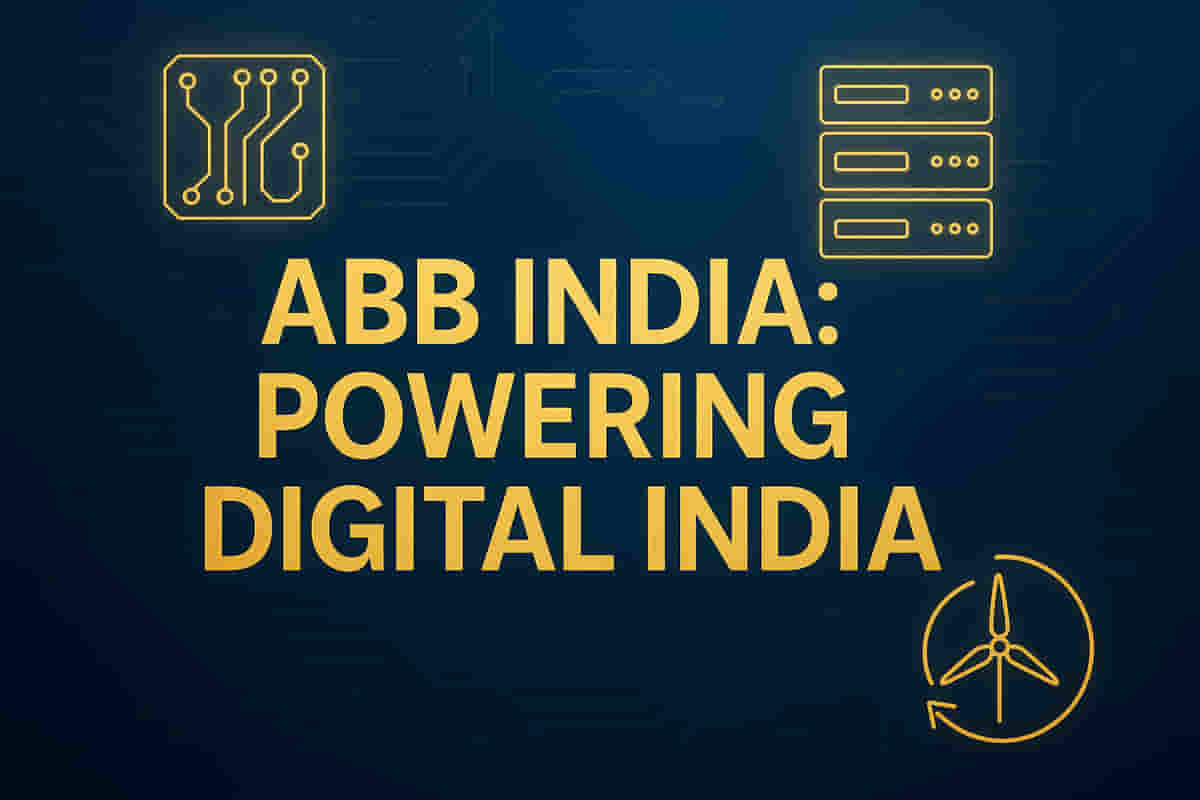INDIA'S INVISIBLE GIANT AT A CROSSROADS: ABB India Fuels Digital Boom But Faces Profit Squeeze! Click to Uncover!
Industrial Goods/Services
|
Updated on 12 Nov 2025, 12:29 am
Reviewed By
Simar Singh | Whalesbook News Team
Short Description:

▶
Stocks Mentioned:
Detailed Coverage:
ABB India plays a vital, though often unnoticed, role in powering India's industrial cycle and digital infrastructure, especially in data centers, renewables, and transport. The company is currently navigating an inflection point. After years of strong double-digit growth, its order inflows fell by 3% year-on-year to approximately Rs 3,230 crore in the September 2025 quarter, signalling a slowdown in large industrial projects, though smaller base orders remain robust. This cooling is partly due to a broader capital-goods cycle slowdown and selective private sector expansion.
The significant opportunity lies in India's booming data center sector. ABB's electrification and automation systems are essential for hyperscale and colocation facilities. The company estimates that about one-third of India's large data centers already use its technology. In 2024, it expanded domestic manufacturing for energy-efficient drives and launched ultra-premium IE5 efficiency motors for data centers. India's data center capacity is projected to triple by 2030, offering long-term demand.
A near-term challenge is India's new Quality Control Order (QCO), mandating Bureau of Indian Standards (BIS) certification for electrical products. Inadequate testing infrastructure has forced ABB to import components, increasing costs (especially with a weaker rupee) and shaving off an estimated 75 to 150 basis points from segment margins. This issue is temporary and expected to resolve in three to four quarters.
Financially, ABB India remains strong, being debt-free with robust operating cash flows, an asset-light business model, and efficient working capital management. While revenue grew 17% in 2024 to Rs 12,188 crore, projections for 2025 suggest slower growth or a slight contraction. Its return on equity (RoE) stands at approximately 28.8%, and return on invested capital (RoIC) at 38.6%.
Investor sentiment has turned cautious, with the stock falling over 30% this year, trading at a lower P/E multiple than its historical median, as the market prices in earnings moderation for 2025. The long-term narrative of shifting towards faster-growing sectors like data infrastructure and renewables remains intact.
Impact: This news directly influences investor sentiment towards ABB India and signals potential short-term headwinds in margins and order growth due to regulatory changes and a cooling broader industrial cycle. However, it also highlights the company's strategic positioning in high-growth digital infrastructure and renewable energy sectors, suggesting long-term potential. The QCO issue is a temporary supply chain hurdle, not a structural business weakness. Rating: 7/10
Difficult Terms Explained: Hyperscale data centres: Very large data centers that can scale up to meet massive demand, often run by major cloud providers. Colocation centres: Facilities where businesses can rent space for their servers and IT infrastructure. Capital Expenditure (capex): Money spent by a company to acquire, upgrade, and maintain physical assets like property, buildings, technology, or equipment. Process Automation: Using control systems and information technology to automate industrial processes. Electrification: The process of converting energy systems from fossil fuels to electricity. Motion businesses: Refers to ABB's business segment that focuses on electric motors, generators, and drives. IE5 motors (International Efficiency Class 5): A designation for ultra-premium efficiency electric motors, representing the highest level of energy efficiency. HVAC: Heating, Ventilation, and Air Conditioning systems, crucial for maintaining stable environments in data centers. Quality Control Order (QCO): Government regulations mandating quality standards and certifications (like BIS) for specific products. Bureau of Indian Standards (BIS): India's national standard-setting body. Basis points: A unit of measure used in finance to denote one-hundredth of one percent (0.01%). 75 basis points = 0.75%. Forex (Foreign Exchange): Exchange of one currency for another. Forex losses occur when a currency weakens against another. Capital-goods sector: Industries that produce goods used by other industries to produce goods and services (e.g., machinery, equipment). Asset-light business model: A business strategy where a company minimizes ownership of physical assets, relying more on intellectual property, services, or outsourced operations. Working capital management: Efficient management of a company's current assets and liabilities to ensure smooth operations and sufficient liquidity. Return on equity (RoE): A profitability ratio that measures how effectively a company uses its shareholders' equity to generate profits. Return on invested capital (RoIC): A profitability ratio that measures how well a company generates profits from all the capital invested in its operations. Dividend yield: A financial ratio that shows how much a company pays out in dividends each year relative to its stock price. Price-to-earnings (P/E) multiple: A valuation ratio that compares a company's stock price to its earnings per share, indicating how much investors are willing to pay for each rupee of earnings.
Banking/Finance Sector

Unlock India's $990 Billion Fintech Secret: 4 Stocks Poised for Explosive Growth!

Indian Mutual Funds Paradox: Why AMCs Push Thematic Funds While Investors Turn Cautious?

Unlock India's $990 Billion Fintech Secret: 4 Stocks Poised for Explosive Growth!

Indian Mutual Funds Paradox: Why AMCs Push Thematic Funds While Investors Turn Cautious?
Stock Investment Ideas Sector

Market SURGES Back! Expert Reveals 3 Must-Buy Stocks for BIG Gains Today!

DIIs Unleash ₹1.64 Lakh Crore On Indian Stocks! Top Picks Revealed Amidst FII Exit - What's Next?

Market SURGES Back! Expert Reveals 3 Must-Buy Stocks for BIG Gains Today!
